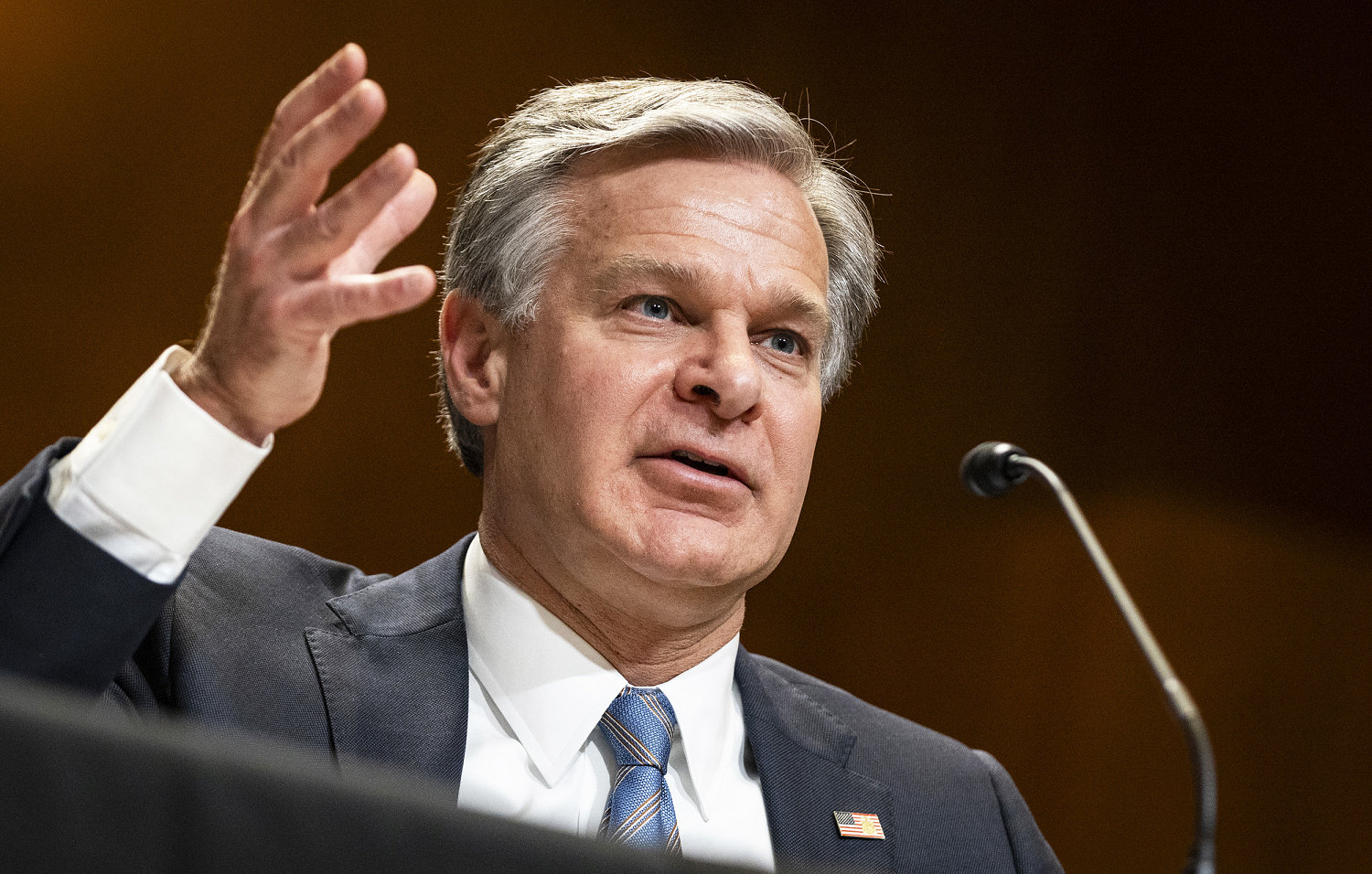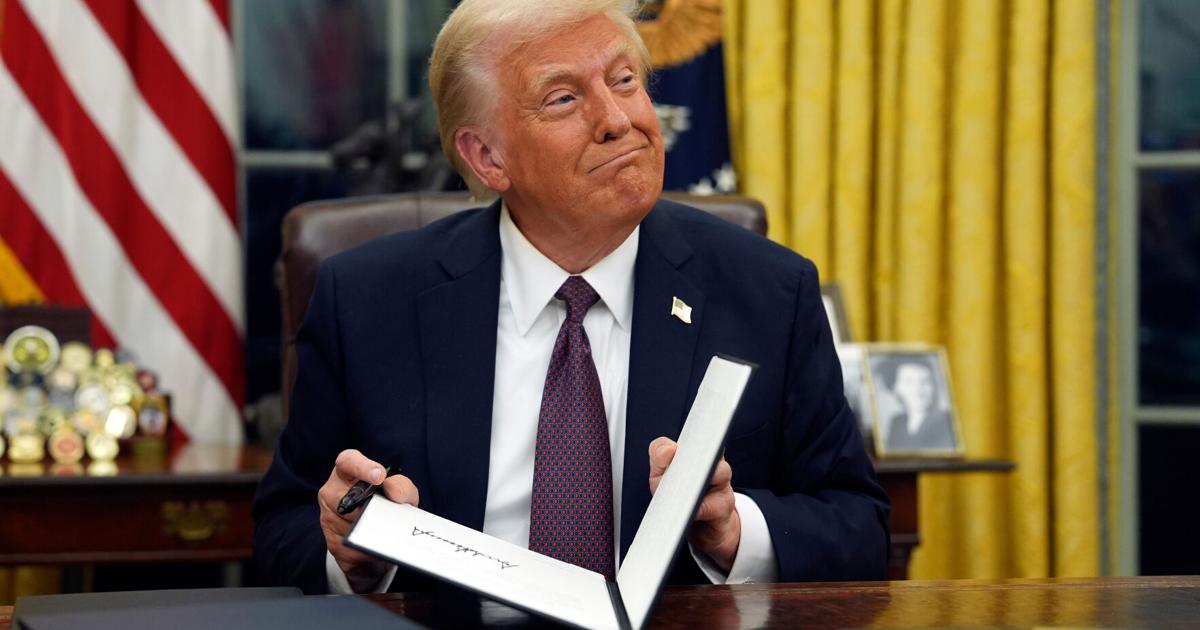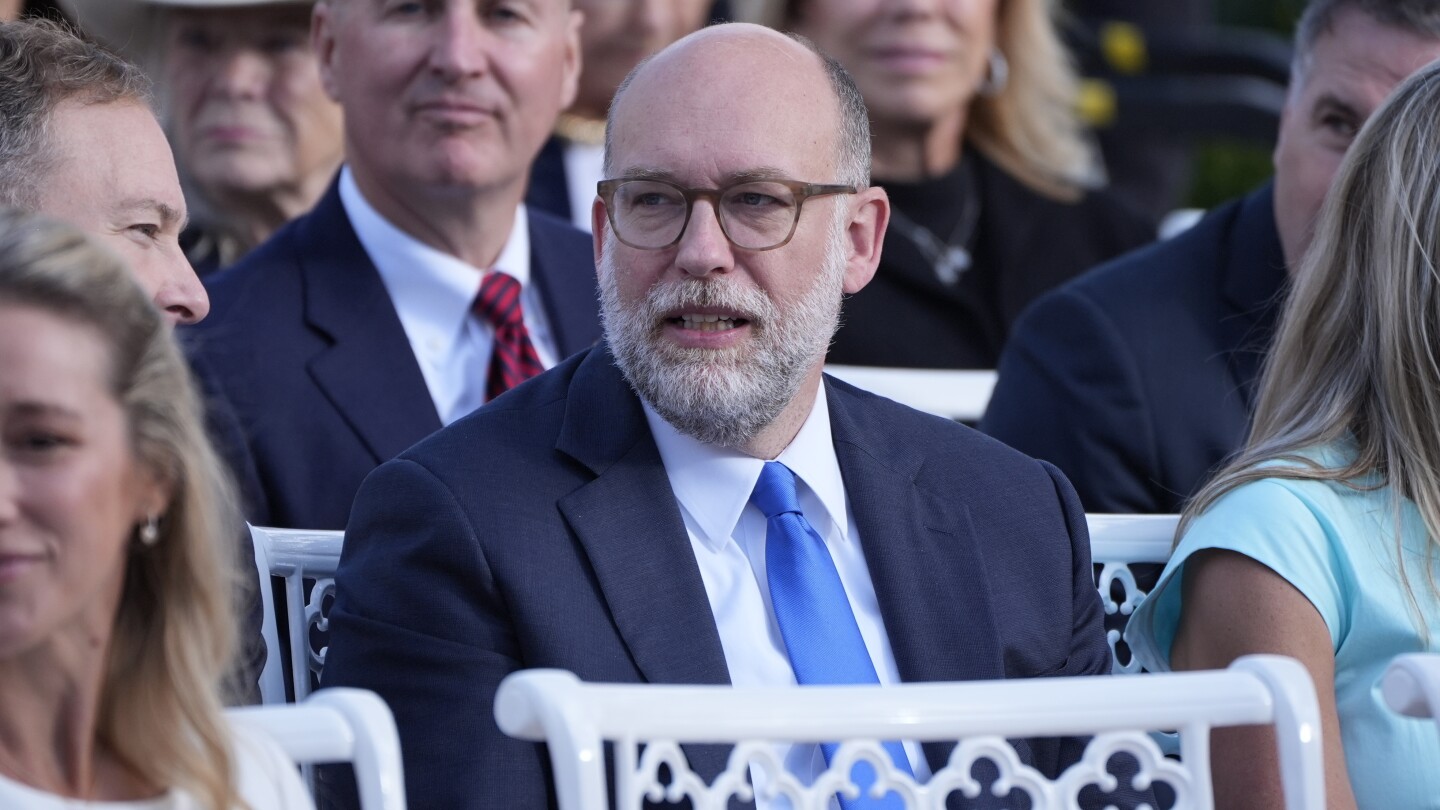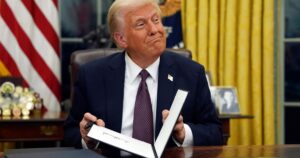The Dictatorship
Trump adds Chris Wray and Merrick Garland to his growing list of prosecution targets

A month ago, Donald Trump targeted his former handpicked FBI director, Christopher Wray, in a new and creative way. As part of a weird and discredited conspiracy theory, the president spun a ridiculous tale about Wray having lied about imaginary FBI agents who participated in the Jan. 6 attack.
Though none of this made any sensethe Republican told NBC News a day later that he believed Wray engaged in “inappropriate” behavior during his tenure at the bureau and said he “would think” the Justice Department is investigating him.
“I would imagine. I would certainly imagine. I would think they are doing that,” Trump said when he was asked whether the Justice Department should investigate Wray.
A month later, the president was even less subtle. The New York Times reported:
Trump called for prosecution of former Attorney General Merrick Garland and former F.B.I. Director Christopher Wray, among others, in a rant on his social media platform on Friday night — replete with misinformation and debunked lies about the 2020 election. Trump, seizing on the release of documents showing the Biden Justice Department requested metadata on calls between the White House and Republican senators during the investigation into Trump’s attempt to overturn the election, claimed without evidence that the department ‘taped’ the calls.
For reasons unknown, Trump, while presumably focused on his trip to Asia, published an absurd online tirade about newly disclosed “documents” that don’t appear to exist. As part of the same harangue, the president claimed there’s now “conclusive” evidence against Wray, former special counsel Jack Smith, former Attorney General Merrick Garland and former Deputy Attorney General Lisa Monaco.
According to Trump, the quartet “spied on” members of Congress (which never happened in reality), “taped” the lawmakers’ phone calls (which also never happened in reality) and “cheated and rigged the 2020 Presidential Election” (which was not rigged).
The post concluded, “These Radical Left Lunatics should be prosecuted for their illegal and highly unethical behavior!”
None of these people are “radical left lunatics”; three of the four weren’t in office on Election Day 2020 and couldn’t have “rigged” anything; and there is literally no evidence of any of them engaging in “illegal” or “unethical” behavior.
Trump’s hysterics, in other words, reflect the perspective of someone living in an alternate reality.
But while the broader conversation about the president’s cognitive state continues to have merit, what I cared most about was his “should be prosecuted” phrase.
Nine days before publishing this nonsense, during an event in the Oval Office, the president pressed the nation’s three most powerful federal law enforcement officials — the incumbent attorney general, the deputy attorney general and the director of the FBI — to prosecute Smith, Monaco and former FBI general counsel Andrew Weissmann.
For good measure, the president soon after addedin reference to Democratic Sen. Adam Schiff of California, “I hope they’re looking at ‘Shifty’ Schiff. I hope they’re looking at all these people,” before also endorsing a federal investigation into his election defeat in Georgia five years ago.
Weeks earlier, Trump posted an item to his online platform that directed Attorney General Pam Bondi to go after three of the president’s perceived political enemieswhom he said were “guilty as hell” of unidentified crimes.
As is always the case, while focusing on those in the White House, it’s important to watch what they do, not just what they say. The trouble in this instance, however, is that officials in Trump’s Justice Department have a scandalous habit of launching investigations — and in some cases, even securing dubious indictments — targeting those on the president’s growing enemies list.
In other words, when Trump barks orders about those he wants to see prosecuted, there’s a team of presidential appointees who take these outlandish directives seriously, which makes them harder to simply brush off as meaningless palaver.
Steve Benen is a producer for “The Rachel Maddow Show,” the editor of MaddowBlog and an BLN political contributor. He’s also the bestselling author of “Ministry of Truth: Democracy, Reality, and the Republicans’ War on the Recent Past.”
The Dictatorship
Federal judge blocks the Trump administration from pulling funding for sex ed on gender diversity

PORTLAND, Ore. (AP) — A federal judge in Oregon has blocked President Donald Trump’s administration from pulling sexual education funding over curricula mentioning diverse gender identities.
U.S. District Judge Ann Aiken issued the preliminary injunction Monday as part of a lawsuit filed against the Health and Human Services Department by 16 states and the District of Columbia, which argued that pulling such money violated the separation of powers and federal law.
The complaint, filed last month, says the department is attempting to force the states to “rewrite sexual health curricula to erase entire categories of students.” It describes the action as “the latest attempt from the current administration to target and harm transgender and gender-diverse youth.” The administration said in court filings that Health and Human Services has the authority to impose conditions for receiving funding grants.
Aiken wrote that the department “provides no evidence that it made factual findings or considered the statutory objectives and express requirements, the relevant data, the applicable anti-sex-discrimination statutes and its own regulations.” The judge added that the department also “fails to show that the new grant conditions are reasonable.”
The department did not immediately respond to an emailed request for comment, but said in a previous statement after the complaint was filed that it was “committed to its mission of removing radical gender and DEI ideology from federal programs,” referring to initiatives focusing on diversity, equity and inclusion.
Stay up to date with the latest news from AP.
Minnesota Attorney General Keith Ellison, whose state co-led the lawsuit with Oregon and Washington, welcomed the ruling and said he was “pleased to have protected funding for important health education programs.”
Since President Donald Trump returned to the White House in January, his administration has sought to recognize people as only male or female.
Health Department went after 2 programs
The health department wants to prohibit the inclusion of what it describes as “gender ideology” in lessons funded by the Personal Responsibility Education Program (PREP) and the Title V Sexual Risk Avoidance Education program. The federal grants are used to teach about abstinence and contraception for the prevention of pregnancy and sexually transmitted infections.
The plaintiff states said the grant conditions the department is seeking to impose violate federal law, the separation of powers and Congress’ spending power. They also argued that losing the money would harm state programs by making them less effective in providing sex ed, including to youth at high risk of becoming pregnant or contracting sexually transmitted diseases.
The termination of money under the two federal grant programs could result in a loss of at least $35 million to the plaintiff states, according to the complaint.
In court filings, the administration said agencies have the authority to impose grant terms and argued that claims against the federal government over contracts, including grants, should be heard by a different court, the U.S. Court of Federal Claims.
In April, the health department asked the plaintiff states to share curricula and materials used for lessons funded by the PREP grant, according to the complaint. In a letter, the department said it was conducting a “medical accuracy review.”
In August, the department issued new conditions prohibiting grant recipients from “including gender ideology in any program or service that is funded with this award.” That month, it warned states that they had 60 days to change lessons or lose their PREP grants; California was warned previously, and its $12 million grant was stripped Aug. 21.
At the heart of some of the legal debate in the case is the definition of “medically accurate.” Under federal law, curricula under the two programs must be “medically accurate and complete.”
“The agency’s restriction on ‘gender ideology’ ensures that federal funds support curricula rooted in biological and medical science rather than in contested sociopolitical theories regarding gender identity,” the administration said in court filings.
The plaintiff states argued their programs are medically accurate and submitted written declarations from health experts such as Kate Millington, a pediatric endocrinologist and associate professor of pediatrics at Brown University.
“Stating that gender is binary and that other non-binary gender identities do not exist is not consistent with the medical and scientific understanding of gender identity,” Millington said.
In court filings, Minnesota officials shared examples of materials that Health and Human Services flagged for removal, such as curricula mentioning different pronouns and how some people identify with a gender that is different than their biological sex.
Washington Attorney General Nick Brown previously said the department threatened to cancel PREP grants if his state didn’t remove wording from a high school curriculum that says: “People of all sexual orientations and gender identities need to know how to prevent pregnancy and STIs, either for themselves or to help a friend.”
The other plaintiffs are Colorado, Connecticut, Delaware, Hawaii, Illinois, Massachusetts, Maryland, Maine, Michigan, New Jersey, New York, Rhode Island and Wisconsin. All plaintiff states have Democratic governors.
The Dictatorship
Russian oil company Lukoil to sell international assets in response to Trump sanctions

FRANKFURT, Germany (AP) — Russian oil company Lukoil says it is selling its international assets in response to sanctions imposed by U.S. President Donald Trump that aim to push Russia to agree to a ceasefire in its war against Ukraine.
The company said in a statement that it was already talking with potential purchasers. The transactions would be carried out under a sanctions grace period that allows transactions with Lukoil until Nov. 21, and the company said it would seek an extension if necessary to complete the transactions.
Lukoil has stakes in oil and gas projects in 11 countries. It has refineries in Bulgaria and Romania and a 45% stake in a refinery in the Netherlands, as well as gas stations in a number of countries.
Trump on Oct. 22 announced new sanctions against Lukoil and Rosneft, Russia’s two biggest oil companies accounting for roughly half of the country’s oil exports. Oil and gas revenues are a major source of government revenues in Russia. Treasury Secretary Scott Bessent called on Russia to immediately agree to a ceasefire in Ukraine.
The sanctions make it difficult for Lukoil and Rosneft to do business outside of Russia. In addition to barring U.S. businesses from dealing with the two companies, the sanctions carry the threat of secondary sanctions on foreign banks that handle their transactions. That means any bank that wants to maintain contact with the dominant U.S. financial system will think twice about doing business with them.
Rosneft has a stake in a refinery in Schwedt, Germany, but the German government has taken custody of the stake and the facility no longer sends revenue to the parent company.
Stay up to date with the latest news from AP.
The sanctions take aim at Lukoil and Rosneft’s sales to India and China. Russia shifted oil flows to Asia after the European Union barred most Russian seaborne oil imports.
The sanctions have raised questions about whether refineries in India would halt purchases to avoid entanglement with sanctions. The two companies account for some 60% of India’s imports of Russian crude, according to Shumita Deveshwar, chief India economist at GlobalData TS Lombard. Trump has put a 25% import tariff on India goods above a 25% tariff on most Indian goods imports to the US.
Asked about Trump pressuring India and China to stop buying Russian energy, Kremlin spokesman Dmitry Peskov on Tuesday told a conference call of reporters: “We are offering our product. This product is of strategic importance to many countries. It is competitive, it is attractive. And then it’s up to the countries themselves to decide how attractive it is and how much other alternatives offered can compete with our products.”
The Dictatorship
Courts are hampering Trump’s efforts to cancel funding approved by Congress

Congress has the constitutional power of the purse, but President Donald Trump’s robust assertion of executive authority is testing even that basic tenet of U.S. democracy.
His administration has already canceled or threatened to cancel billions of dollars of previously approved federal spending and now wants to go after even more funding during the government shutdown.
States, cities, nonprofits and other groups have responded with more than 150 lawsuits accusing the Republican administration of an unlawful power grab.
An Associated Press analysis shows that so far, those suits are mostly succeeding in blocking the Republican president’s spending moves, at least temporarily. But most of the legal battles are far from over, and the Supreme Court, where Trump so far has been more successfulcould have the final word on at least some of them.
The court’s conservative majority has been receptive at least in preliminary rulings to many emergency appeals from the administration. Legal experts say a pair of recent decisions by the court may bode well for the administration’s push to gain more control over government spending. Here’s a look at the current legal score and what could lie ahead:
Courts have mostly ruled against the administration so far
As of early October, court orders were at least temporarily blocking the Trump administration’s decisions in 66 of 152 lawsuits over federal spending, an AP analysis shows. In 37 of those cases, courts had allowed the administration to proceed. In 26 of the cases, a judge had yet to rule on the matter. The remaining 23 had either been dropped or consolidated.
The count reflects decisions by district courts, appeals courts and the U.S. Supreme Court and will almost certainly change as the cases progress.
The flurry of litigation reflects not only the administration’s aggressive effort to wrest control of spending, but the Republican-controlled Congress’ unwillingness to push back, said Zachary Price, a constitutional law professor at the University of California College of the Law, San Francisco.
“Congress seems to be following its partisan interests more than its institutional interests, and that puts a lot of pressure on courts,” he said.
It’s hard to say how much money the administration has withheld
Government watchdogs say the administration is blatantly ignoring a requirement in the 1974 Impoundment Control Act to report funding freezes to Congress.
Research by Democrats on the House and Senate Appropriations Committees estimated the administration was freezing, canceling or seeking to block a total of $410 billion as of early September. That’s equivalent to about 6% of the federal budget for the year that ended on Sept. 30.
The administration has disputed that number.
Since the shutdown started this month, the administration has targeted even more fundingprimarily in places represented by Democrats.
The Trump administration is taking a page from Nixon
Legal scholars say no president has attempted massive, unilateral cuts like these since Richard Nixon. The moves reflect an expansive view of executive power that is at odds with the Impoundment Control Act, court rulings and the Constitution, which grants Congress supremacy over spending, experts say.
“The power they’ve claimed is the power to delay and withhold funds throughout the year without input from Congress,” said Cerin Lindgrensavage, counsel with Protect Democracy, which is involved in multiple lawsuits against the administration. “That’s a theft of Congress’ power of the purse.”
In a message to Congress earlier this year, the White House said it was “committed to getting America’s fiscal house in order by cutting government spending that is woke, weaponized, and wasteful.”
White House budget director Russ Vought, a proponent of withholding federal funds, has argued presidents long had the power to spend less money than Congress appropriated if they could cut waste or be more efficient, and that power is needed to address the country’s massive debt.
The government shutdown opened up a new opportunity to cut spending, he said this month on “The Charlie Kirk Show.”
“If I can only work on saving money, then I’m going to do everything I can to look for opportunities to downsize in areas where this administration has thought, ‘This is our way towards a balanced budget.’”
The administration has cut entire agencies
The 152 cases the AP identified challenge the closure of government agencies and offices, the cancellation of grants and other assistance and the attachment of new conditions on federal funding.
The administration has used the cuts, or threat of cuts, to try to impose its policies on gender, raceimmigration and other issues.
But it’s not just money on the line. The funds supported jobs, school lunches, health programs, scientific research, infrastructure projects, foreign assistance, disaster preparedness, education initiatives and other programs.
Some notable rulings against the administration include the restoration of funding to 14 states that filed suit over nearly $2 billion withheld for electric car chargers and a block on potentially broad funding cuts to some of the country’s largest cities over their “sanctuary” immigration policies.
Judges have raised constitutional concerns
Judges who have ruled against the administration have often found strong reason to conclude the cuts, or threat of cuts, would violate the Constitution’s separation of powers by usurping Congress’ authority over spending.
They have also ruled the moves were most likely arbitrary under the Administrative Procedure Act, a law that governs the process by which federal agencies develop and issue regulations.
Judges who have sided with the administration have likened at least some of the legal claims before them to contract disputes that belong in a different court: the U.S. Court of Federal Claims.
That court, which traces its origins to the mid-1800s, handles lawsuits by citizens seeking money from the federal government. Referred to as “the People’s Court,” it is separate from the district courts that are handling most of the high-profile litigation against the administration.
The Supreme Court has often sided with the White House
The high court’s conservative justices have allowed the administration to move ahead for now with plans to shutter the Education Department, freeze $5 billion in foreign aid and cut hundreds of millions of dollars for teacher training and research supported by the National Institutes of Health.
Those decisions may make it harder to challenge the administration’s spending cuts, though the high court has not yet considered their ultimate legality or overturned lower court rulings.
In the National Institutes of Health case, the high court ruled 5-4 in August that lawsuits over the cancellation of grant funding generally cannot be handled entirely by federal district courts. Instead, plaintiffs must sue in federal claims court for any money and turn to the district courts if they want to challenge the guidance that led to the grant terminations.
The impact of the Supreme Court’s decision is still unfolding, but it could force plaintiffs in the grant funding cases to start over in a new courtroom. In some cases, plaintiffs might have to decide if they want to sue on two fronts.
In the foreign aid case, the Supreme Court in a 6-3 decision in September suggested the Impoundment Control Act did not give private parties the right to sue over so-called pocket rescissions.
That’s when the president submits a request to Congress not to spend approved money, but does it so late in the fiscal year that Congress doesn’t have time to act and the funds go unspent.
Trump notified House Speaker Mike Johnson in August of a pocket rescission for the $5 billion in congressionally approved foreign aideffectively cutting the budget without going through the legislative branch.
Though the Supreme Court stressed its decision was preliminary, legal experts say it could make it easier for the Trump administration to use the tactic again.
___
Associated Press writer Lindsay Whitehurst contributed to this report.
-
Uncategorized12 months ago
Bob Good to step down as Freedom Caucus chair this week
-

 Politics8 months ago
Politics8 months agoFormer ‘Squad’ members launching ‘Bowman and Bush’ YouTube show
-

 The Josh Fourrier Show12 months ago
The Josh Fourrier Show12 months agoDOOMSDAY: Trump won, now what?
-

 The Dictatorship8 months ago
The Dictatorship8 months agoPete Hegseth’s tenure at the Pentagon goes from bad to worse
-

 Politics8 months ago
Politics8 months agoBlue Light News’s Editorial Director Ryan Hutchins speaks at Blue Light News’s 2025 Governors Summit
-

 The Dictatorship9 months ago
The Dictatorship9 months agoLuigi Mangione acknowledges public support in first official statement since arrest
-

 Politics12 months ago
Politics12 months agoWhat 7 political experts will be watching at Tuesday’s debate
-

 Politics8 months ago
Politics8 months agoFormer Kentucky AG Daniel Cameron launches Senate bid






